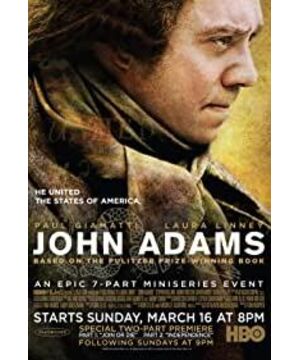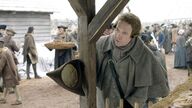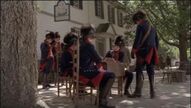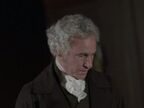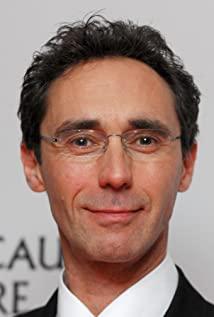Warning: Completely spoiled, do not read the text before watching the show/Aaron, no representation, no taxation. John Adams, who practices as a Boston lawyer, tends to be centrists in the political atmosphere of the rising tide of the British, and wanders in the radical and angry Massachusetts. Between the people and the British colonial officials in North America, both sides are trying their best to draw him to serve his position. John Adams is hesitating. On the one hand, he believes that the North American people should be equal to the native British, and on the other hand, he believes that the rule of the British king is far from coming. The degree of tyranny. However, tyranny is always self-destructive, that is, it destroys itself, which is prominently manifested as pushing the centrist to the side of the enemy. At the end of the first episode, the swinging "centre" John Adams finally decided on his position-not so much that he chose it himself, as it was chosen for him by the King of England and his government, and that is to stand for the people of New England. On the one hand, stand on the side of the Continental Congress, which represents their interests. Declaring independence is different from what people usually imagine. The writer of the Declaration of Independence was not a central figure who made a big splash at the Continental Congress, but a taciturn and introverted man who was almost on the sidelines. It was also different from what people imagined. When the representatives—the so-called American founding fathers—take a decisive step in voting, they are not full of pride and confidence in victory, but are immersed in an atmosphere of uncertainty about their future. At the beginning of the second episode, Lexington’s gunfire had already started. The entire episode was a struggle between the 13 colonial representatives of the Continental Congress over whether or not to be independent. In the end, the protagonists (pessimists, progressives) compromised. The protagonists (optimists, radicals) led by Adams and Franklin used tenacious and tenacious debates, persistent and patient persuasion, combined with the work of individual representatives, and finally promoted The adoption of a unanimous resolution agreeing to independence. In this episode, the world-famous major "founding fathers" of the United States also appear on the scene-they are not familiar with each other. I don’t know if this is true in history, or because it has deliberately raised the position of the master, or the narrative from the perspective of the master can only be so. In short, John Adams played the role of a central figure: he was the first to propose a unified leadership of the army by Washington, he was the first to suggest to Jefferson that the latter draft a declaration, and it was he who mediated between the representatives of the colonies that opposed independence and finally won the concession. Because of his outstanding work, his outstanding leadership, communication skills, and infectious enthusiasm, he finally urged the 13 colonies to unite willingly or reluctantly in the current trembling of the enemy. But this is not to say that the creator has let go of his weaknesses. Compared with Jefferson, he is an outgoing, conceited and impatient person. Fortunately for him, Franklin reminded and helped him to realize the shortcomings of his previous strategy, and was able to restrain his faults at the critical juncture of the final debate and maximize the potential of being proficient in speeches. From an organizational point of view, this drama also reminds a successful team again who must be equipped with: a truly mature and experienced wise man (Franklin) who is good at mastering rhythm and temperament, a loyal and talented behind-the-scenes propagandist with a steadfast faith in his heart (Jefferson), a symbolic pillar (Washington) who can stand on the front line leading practical work, and most importantly, a political activist (Adams) who can bring all these people together. In this episode, Franklin is the most beautifully portrayed conference representative besides the biography. A respected, witty and humorous old fox, he knows when and in which way to shoot, and he is not as scornful as Jefferson. , Not as aggressive as Adams. Without his support and advice, our Biography Master might suffer a lot. He is worthy of Adams's most important partner and top hero in this battle. Adams, the not-sacred alliance, served as Franklin's assistant to Bourbon France to negotiate a joint fight against Britain. The extravagant, corrupt and slightly erotic Bourbon France brought Adams a huge Culture Shock, It made him dizzy and deeply uncomfortable. However, one of the most interesting facts of the human political world is that real interests can often lead to the most incredible alliances. Franklin, the old fox, is well versed in diplomatic activities with France because he knows this well. In contrast, Adams exposed his weaknesses more profoundly here: his straightforward and sharp style may be very suitable for parliamentary debates, but it is not suitable for diplomatic occasions that require soft skills and patience. For his national mission, he almost forcibly endured his deep aversion to the Catholic aristocratic tradition of smearing powder, biting his head and dealing with the French. However, Jiangshan is easy to change, and his nature is hard to change. He finally offended the French and almost destroyed the foundation of Franklin's long-term work in France. Franklin submitted a report to the Continental Congress, accusing Adams of making mistakes in his diplomatic work, and was approved by the meeting to remove him from his post in France. This unpleasant experience in France may have buried the roots of the two who later developed into political enemies. But as far as the incident in France is concerned, history proves that Franklin's direction of work is correct. With his personal charm of the fashionable "scientist" at the time, he circulated among the rich and powerful class of Bourbon and gained a huge reputation. But in that case, his personal reputation capital will be transformed into the real interests of the new United States. It can be said that any mature and experienced politician and diplomat will do this, that is, for the benefit of the country, temporarily putting aside ideological prejudices. And all of this is undoubtedly what the diplomatic immature Adams did not understand. Soon, he repeated the same mistakes in the Netherlands. Compared to France, he certainly prefers and is therefore more willing to turn to the Netherlands, which is closer to North America in religious and political aspects. He thought the Dutch would probably not be as disgusting as the French monarchy. But this time he was wrong again. Compared with the old fox, he is too young, too simple, sometimes naive. The abacus-savvy Dutch businessman doesn't think about the big talk of common values at all, but only cares about the probability of the two sides in the war and the debt solvency determined by this. In other words, they lend money to whoever wins. This is undoubtedly another slap to Adams. The room leak happened to be rainy, and Adams fell ill with shame and anger. This episode deliberately uses a lot of things similar to the style of hand-held records in the film and television techniques, which makes the audience feel more immersive. Adams's embarrassment caused by not being able to speak French and not learning French court rituals, as well as the torment of miscarriage of duties and concurrent illness, falling down like a mountain and missing his wife, have all been fully manifested. It can be said that compared to the "grand narrative" in the previous two episodes, this episode pays more attention to portraying the inner activities of the biography owner and his family members. If the first two episodes can be regarded as historical documentaries, then this episode is true biographical literature. Another interesting detail of this episode is that when a British ship was unexpectedly encountered in the Atlantic Ocean, the captain asked Adams to give his final order. Adams was the representative of the Continental Congress, and the warship that escorted Adams with arms was appointed by the Continental Congress. This shows that in the independent revolution, politics command the military and civilian officials command military attachés. The peasants with live ammunition on this land of North America have never known the tradition of warlords. The army is nothing but the people's own armed forces under the leadership of the Continental Congress, the highest authority. This kind of fortune was not available in the Revolution of 1911. With the great success of Yorkshire, the founding of the nation, Britain was forced to recognize the new North American country, and the independence revolution was successful. Jefferson replaced Franklin as the ambassador to France, and Adams became the first ambassador to the UK. When the three of them were still in detention in France, there was a frank and sharp discussion about the state system, and the differences were serious. But Franklin thought it didn’t matter, because our nation is founded on the right to disagree. Adams and his wife are on a mission to England. He awkwardly and reluctantly completed a series of rituals necessary for foreign envoys to meet with the king, and then nervously and firmly told the new United States' desire to maintain peace and friendship with the British Empire. George III's face was dumbfounded, after all, this group of people was a complete traitor in his eyes. At the end of the meeting, he was even more malicious and suddenly sent a "blessing" that was almost a curse, praying that the first republic on earth would not have good luck. The Adams and his wife hated life in the United Kingdom. The red tape and the attack made them overwhelmed. They missed their motherland and children even more. So they made a request to the Congress to return to their homeland. They received a grand welcome at the American dock. At this time, the Constituent Assembly has passed the Federal Constitution and decided to elect the president, vice president and other federal posts. Washington and Adams took the first and second votes and took the oath of office amidst the cheers of the people in New York. In this episode, Adams's cute image as a proud old man with strong self-esteem is more vividly portrayed: he is reluctant to write to his wife because of his failure in diplomatic activities, because he is afraid of being looked down upon by her; he is because his wife praises Jefferson's charm He was so jealous that he had to take the opportunity to ridicule the latter when he released the hot air balloon; he was upset because he lost the vote to Washington for not becoming president, but he burst into tears when the latter was sworn in. As before, the major historical process has been taken away as the background. The camera always closely surrounds the master’s family, showing the true side of Adams as a flesh-and-blood person, not hiding evil and not imaginary beauty. In the eyes of the creators, the founding fathers have the same vivid and full personality as the gods on Mount Olympus. They will still be jealous, vain, and strong, but these will not change their undisguised Anglo-French monarchy. Disgust will not obliterate their sincerity in tears at the glorious moment. Finally, add a digression: When the hot air balloon was released, Adams satirized Jefferson slightly, saying that the latter was talking about hot air. This is of course a pun, because hot air itself is an idiom. It means "profoundly elegant, beautiful and beautiful but meaningless empty words." However, what is actually very interesting here is that Jefferson’s words are not so much empty words, but rather prophecies, the Son of Enlightenment’s optimistic outlook on the future of mankind. It has been more than two centuries since the launch of this hot air balloon that the means of mankind's soaring into the sky have changed with each passing day; in fact, a century later, French writer Verne wrote "Around the Earth in Eighty Days." Therefore, we must regard this tiny detail not only as a need for characterization, but also as a clever comment on the background of the Enlightenment era. The fifth episode of the two-party system is a very good episode. It can be used as a teaching courseware and video case for political science and political philosophy. Many of the lines are wonderful. Hamilton finally appeared, and the founding fathers split into two factions: Republicans headed by Jefferson and Federalists headed by Hamilton. President Washington does not like this kind of partisanship, and relies on his prestige to try to maintain balance and unity. But for the future of the Federation, everyone seemed to smell a trace of ominousness. Also caught in the middle is the Biography Master himself. Politically speaking, Adams is a supporter of strengthening the authority of the central government, that is to say, he belongs to the Federalist; but from a personal emotional point of view, Jefferson has forged a deep friendship with his family during their stay in France. A personal friend, he does not completely agree with his political views, but trusts his character. On the contrary, he does not have such friendship with Hamilton, who is a political party. In Anglo-American political culture, parties are very much like customary law. First, they are an objective existence that arises naturally and then confirmed after the fact, rather than a rational (rational) organization like a "company". Republicans, The names of Federalists are first called by people, not registered first. Today's "Tea Party" still continues this tradition. To deny the objective existence of parties on the grounds of the informality of the organization is a cover-up. It can also be seen from this play that the main responsibility of the vice president is to supervise legislation in Congress. In Adams’ own words, he has listened to hours of lengthy debates without the right to have a say. However, when parliamentarians have an equal number of votes, the law gives the vice president the right to cast a decisive vote. Today, whenever Obama delivers a State of the Union address, Vice President Biden and Speaker of the House of Representatives Boehner sit on both sides of the president’s back. This is about the continuation of this tradition. In this episode, the differences between Jefferson and Hamilton, setting aside the issue of the border between the federal government and the president himself, are mainly manifested in two things: First, Jefferson’s so-called "Britishization" of the American economy, namely Relying on financial capital to lead the development of large-scale industries; the second is the attitude towards the French Revolution that had already broken out at that time. Hamilton actively promoted the "Britishization" economic model, and chose pragmatic neutrality in diplomacy. Jefferson's attitude was tit-for-tat. He believes that the economic model promoted by the Federalists is to make the newly born North American Republic once again become an economic colony of the British Empire. In other words, it means the loss of the achievements of the revolution. What's more, it will cause the North to overwhelm the South, and the gap between the two sides will increase. The bigger, until the federation cannot be maintained. As the former ambassador to France and the current Secretary of State, he even more clearly supported the French Republican Revolution. Hamilton, Adams, and even Washington himself are all cautious in their diplomacy and are unwilling to intervene in the European war that is about to come. The French Revolution took the world by storm—the last rebellion comparable to it, probably the time when Lucifer was on the northern boundary of the kingdom of heaven—the European monarchies did not share the sky with it, and thus inevitably attracted foreign interference. To openly support France means losing trade relations with Britain, and even peace with Britain. This is something the new United States cannot afford. However, Jefferson's bookishness lies in that he is not a person who will make concessions to ideological principles for practical benefits. His reason is simple, the American Revolution and the French Revolution: they are one and the same. Is his opinion isolated? On the contrary, there is mainstream public opinion. In the Jay Treaty (Jay Treaty), that is, after the U.S.-British Peace, Friendship and Trade Treaty was passed by Congress and signed by the President and became law, shocking waves of protest broke out across the U.S. The people scolded those politicians who perfidious and abandoned the fraternal French Republic in their eyes. President Washington was exhausted and frustrated in the face of the wave of protests. After the expiration of his two terms, President Washington announced his withdrawal. Adams narrowly defeated Jefferson and was elected as the second president by only three votes. As a member of the Democratic Republican Party (the predecessor of the Democratic Party today), Jefferson believed in the sovereignty of the people. He had the will of the people. He advocated the opinion of the majority of the people. That is, the democratic revolutions of the world naturally have the obligation to support each other and are a narrow nation-state. It is shameful for interests to betray such obligations. Should a political idea that is regarded as a standard within the scope of a sovereign political entity should also be applied to the handling of international affairs? Or is it to pursue a completely different approach to international issues, that is, to act on the basis of the survival interests of the sovereign political entity rather than the ideals and principles that are regarded as the norm within its borders? In other words, idealism or realism, internationalism or nationalism, this is an eternal antinomy. On this issue, the main creator of the play also hinted at their bias (of course, you would say, they are undoubtedly biased towards the passer): by portraying Jefferson as a cold, seemingly unpredictable, slightly neurotic unrealistic The author implied a certain danger of his claims and even himself; while the ambassador of Revolutionary France was portrayed as a rude and unruly hairy boy, and a profound court politician in the city of the Bourbon era, and even more with him. The American political elites who have been working for the country are in sharp contrast. They are completely an image of a rebel who has just seized the power of the Ministry of Foreign Affairs. This is the rhetoric of the power represented by the French revolution that the original creator wanted to convey. In short, a centralized center or a decentralized place, nationalist interests or internationalist obligations, elite governance or people’s sovereignty, dependence on foreign countries or independence, widening or narrowing regional gaps-all these are two things that happened between the founding fathers. The struggle of all lines. They actually and eventually split into two parties legally. There has never been a matter of no party outside the party and no party within the party. As for the so-called "gentlemen not party", it is even more deceptive. The Confucian "gentlemen" themselves are one party, so what qualifications do they have to say? Party or not. In the context of the grand event, several consecutive episodes have not forgotten to talk about the relationship between Adams and his family, as well as the 18th-century New England patriarchal style of the story. His interference in the love and marriage of his children, the direction of their career Compulsory orders, the typical Puritans have high demands on the moral standards of honor, responsibility, service to the country, and so on. In addition, through these, it is natural to plant the foreshadowing about the future of the eldest son-John Quincy Adams. There are seven episodes in the miniseries of the second president, and the time period of each episode is very clear. This episode delineates the entire presidency of Adams. It is a very rich and heavy episode. Let’s not talk about other things. First of all, I must give an angry praise to the makeup artist of this play. He has a very fine grasp of the appearance of the characters from their prime to old age. As the series progresses, you can see the senile plaques on the actors’ faces, which are loose. Inlays, and other details are all in place. Adams's presidency is undoubtedly the culmination of his political career, so this episode is not surprisingly the highest praise to the biography. Such as not using public power for personal gain for the children, causing the son and son-in-law to have troubles in their careers, resenting him, and indirectly hindering the happiness of the daughter and the daughter-in-law, etc., which have also been shown in the previous episodes. He always requires his children to stand on their own feet on the basis of self-discipline and diligence, and don't think about relying on opportunism to succeed easily. These are the core three views of the classic old-school Puritans. In the eyes of children, Adams may be a little unkind. He had mixed feelings of anger and guilt for the failure of his second son's education, but his arrogance did not allow him to admit this in public, but he cried bitterly when there was no one in private. He hasn't stayed with him since he was a child, and even when he was in a critical coma, he was caught in a critical business and didn't take a look-yes, Americans also like to express this very vulgar theme. Despite his stiff lips, in his heart, he must have reflected on the fact that he owed his children and their mothers. For this reason, his last order before leaving the presidency was to ask the eldest son to return home from his post in the Netherlands, so that he can be reunited with his mother, and how much relief he has just experienced the pain of losing a son (second son) in his later years to his wife. Apart from these family affairs, the focus of this episode will of course also fall on the major contributions made by the master in the performance of public office, that is: avoiding a foreign war that the United States cannot bear, and avoiding the country's internal division. With the rapid development of Europe, the political differences between Jefferson and Hamilton have reached a very sharp level. In this political polarization (polarization) situation, Adams has fallen behind and is not pleased. In the eyes of Republicans, he was naturally a political enemy of the Federal Party. Even Jefferson felt incredible that he could not support himself—that is, he could not support the revolutionary ideals and causes for which they had worked together—and had to part ways; and In the eyes of Hamilton and his party comrades, he is a shameful traitor and tyrant. In fact, they used every possible vicious and dirty curse-unfortunately all are protected by freedom of speech. Put yourself in the position of the master and think about it, this is not something ordinary people can bear. Abigail made it clear: Even if he can bear it, she can't bear it. But Adams only humorously denied a cripple among the many insults and curses directed at his physical and physical characteristics. He said: I am not a lame (the subtext is: the other ones are facts. In this case, I don’t need to be angry at all. You love to scold. Just scold them)-just brush them off like spider silk. To truly understand Adams’ difficulties, one must understand the situation in Europe at the time and the extent to which the contradiction between Hamilton and Jefferson has developed-this is simply an irreconcilable contradiction, and the two sides are almost labeling "traitors" and "counter-revolutionaries". Buckled on the opponent's head. Cycling and radical France intercepted and killed American merchant ships because the United States continued to trade with Britain, driven fish for the deep, and drove the American people who sympathized with them to their enemies. In view of this serious situation, it is more to use this situation to serve your own political agenda, Hamilton advocated the rectification of coastal defense and the establishment of a standing army to prevent French invasion. Later, it developed to a war with France. What is different from the previous one is that this time, the Federal Party has a majority of public opinion. Although Jefferson strongly opposed it, but unfortunately, the head of French diplomacy that the United States dealt with was Talleyrand! The diplomatic representative of Revolutionary France was a greedy and shameless scumbag. This fact made Jefferson, who was a passionate apologist for the French Revolution, unable to withstand attacks from the Federal Party. According to the inner principle, Jefferson actually went further. He advocated assisting France in the war with Britain. In this transatlantic triangle, the United States is a newly born weak agricultural country on the New World, and Britain and France are European powers. If the United States wants to go to war with either side, it must unite with the other side, otherwise it cannot afford to hurt it. This is exactly what Jefferson and Hamilton argued respectively. The line struggle and political polarization between them have reached such an exaggerated level. Adams understood that either of these two roads would split the United States, so he insisted that the United States cannot go to war with either Britain or France. For this reason, he is stubborn on the left and right, trying his best to be drunk. Although he accepted Hamilton's proposal to strengthen coastal defense to a limited extent, he refused to establish an army because the situation has not yet developed to such a serious degree. Therefore, it is obvious that this proposal is not to overcome the immediate real crisis. Just to take the opportunity to achieve partisan political goals. His great achievement lies in this: He has never considered issues from party opinions, but always from the highest welfare of the country and the people, so he offended Hamilton and others; at the same time, he would not agree to his personal friendship with Jefferson. Help him politically. In this way he made himself enemies on all sides. So he stood sideways, bearing this immature country forward with patience and humiliation. The situation is better than people. Adams' real savior came from the relaxation of the situation in Europe-Napoleon proclaimed the emperor. On the one hand, the coronation of the tyrant ended the radical movement within France, and on the other hand, it opened a new situation for preparing to conquer Europe. These two aspects have contributed to the easing of relations with the United States, especially the war with the United Kingdom, which urgently needs the United States to maintain its neutrality. And this was in Adams's arms. The imminent crisis that the United States may be involved in the Anglo-French war has thus been over. The price Adams paid for this was: the defeat of the re-election election-in fact, the end of his political career. His current president has committed himself to betrayal, but his greatest achievement is to hand over a complete United States to the third president—Thomas Jefferson, This is the greatest political legacy he left to this old friend and political enemy. Adams, who paid such a heavy personal public and private price for reunification and peace, just packed up in the messy White House, and then got into a carriage full of people at the door—not just for him, it was probably equivalent to that. Time's bus. Everyone in the carriage stared at him curiously. The old man is hot: Stop looking, I'm just John Adams, just like you, an ordinary citizen. The curtain call of a coincidence, no matter how great a life is, its ending is also full of sadness and pain. The misfortune of long-lived people may lie in the fact that loved ones are easy to walk in front of them. First is the only daughter, then the wife-this great partner and political adviser who has silently supported him throughout his life. You bury your bones in the mud, and I send the world to the world full of snow, what is its grief? However, long-lived people also have their own fortune. They actually saw their eldest son was elected as the sixth president who participated in the creation of the country. There will be successors to the revolutionary cause. This comfort and pride is probably the greatest happiness a father can have. Up. The series briefly mentioned Quincy Adams’s governance philosophy, including raising federal taxes, organizing public utilities, building infrastructure, establishing national universities, issuing national currencies, etc. Obviously, he is a firmer or even stronger than his father. Federalists. Adams jokingly warned his son: If you do this, you will be scolded as "King Adams II." Then he solemnly warned him: It's better to take it easy and not to rush. This fragment reveals some information about the political struggle in the United States at that time, and it also reflects that the Federalists' proposal to strengthen centralization of power is the general trend. Adams, who experienced the pain of losing his relatives, has a deeper understanding of life. He was finally able to put aside the grudges and grudges between him and Jefferson, smiled his grudges, and began the frequent communication between the two in his later years. Jefferson said: As long as there is a government, differences in political views will always exist. Adams responded: Who is right or wrong between us will be judged by posterity. Dr. Rush, Adams' family doctor and one of the founding fathers of the United States, has a unique view on this. He said: You two are just like the north and south poles of our revolution. In 1826, the fiftieth anniversary of the founding of the United States, the only surviving "fathers of the country" were Adams and Jefferson. To celebrate this grand festival, painter John Trumbull created the famous oil painting "Declaration of Independence" (Declaration of Independence), Specially invited Adams to come and observe. This painting depicts a scene where members of the Continental Congress gathered together to solemnly sign the Declaration of Independence. All the characters on the painting are recognized as the so-called Founding Fathers of the United States. Who knows that the old man has not given face to the great painter and criticized unceremoniously. : Your painting is tampering with history. It was a state of war at the time, and the lawmakers all took the time to sign their names in Philadelphia. They had never signed any declarations like in the picture. Adams opposed the romanticization of history. He feared that future generations would be immersed in the mythological sublime brought by the elevation of art, and forgot the liveliness and vividness of history itself, and forgot the lively struggles and choices, hesitation and perplexity, Fear and vanity, blood and tears and bitterness. He once asked Jefferson in a letter: Who can write the history of our revolution? Jefferson replied: No one can, except let the facts write themselves. In just fifty years, the true history of the revolution has been lost, and the rest is probably a grand narrative full of heroic epic themes like the painting before, but the factual details are exaggerated to the ridiculous fictional artwork. The old man sighed faintly: No one-no one will remember the true history of our revolution. Originally, on the 50th anniversary of the founding of the People’s Republic of China, it was truly a supreme event that two still alive "fathers of the country" could participate in the event. However, on July 4, the day when they brought this country to the earth fifty years ago, the two remaining "fathers of the nation", friends and political enemies of their lives passed away on the same day-such a coincidence is undoubtedly a coincidence. It is twofold. The episode used a montage of contrast to constantly flash between the two in the dying state. They all remembered in a half-awake and half-awake state: Today is the 4th. Actually Jefferson went first, but the last words Adams said before his death was: Thomas Jefferson survives. The youngest son Thomas, who was with him at the last moment, stared at his father blankly, as if he didn't understand the meaning of this sentence. I think Adams wanted to say: It’s okay, I’m leaving, Jefferson is still alive, and there is finally one left, a signer of the Declaration of Independence, who can participate in your celebration! ——Here I shed tears... You can think of this as the sensationalism of the creators, but you cannot deny that this is a sensational opportunity given to them by a great historical coincidence. At the same time, this is a scene with the symbolic meaning of the "main theme": the tension between two dissident patriots will exist forever, beginning and ending at the same time, just like the north and south poles. As a final digression, I didn't find any other voice actors in the show, so it is really a mystery to me how a bunch of American actors speak English accent. Cast's line skills are really nothing to say. In addition, it would be nice if I had a chance to shoot Madison in the future, and it is also a person I am interested in. The four former presidents of the United States are all "fathers of the nation", that is to say, they are all founding fathers of the "older generation"; since the fifth term, their nephews and nephews have succeeded them. Of course, a Paine biopic will be more exciting, but I don’t think it will happen. Everyone will tacitly and carefully avoid this embarrassing person who doesn’t know where to put it. This drama simply pretends that he does not exist, Adams and others suddenly realized from the first to the second episode-yes, it is all on their own, there is no "common sense" in it. Alas, the poor man with no bones... Dec 6, 2014
View more about John Adams reviews


